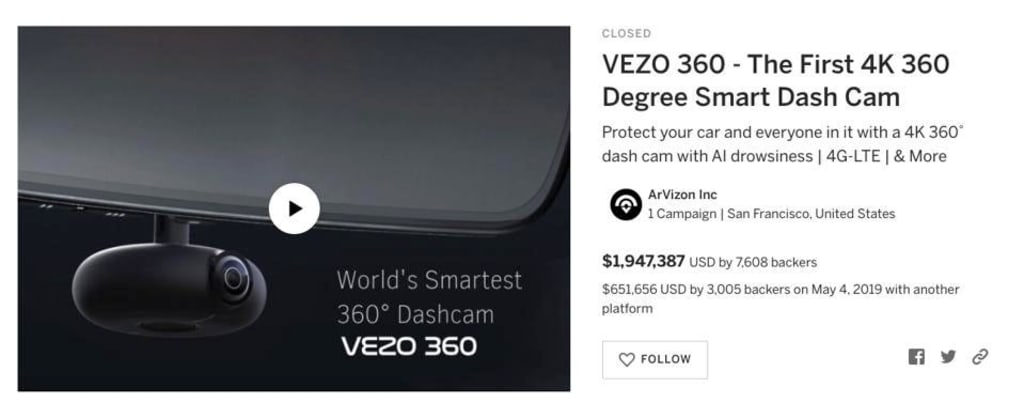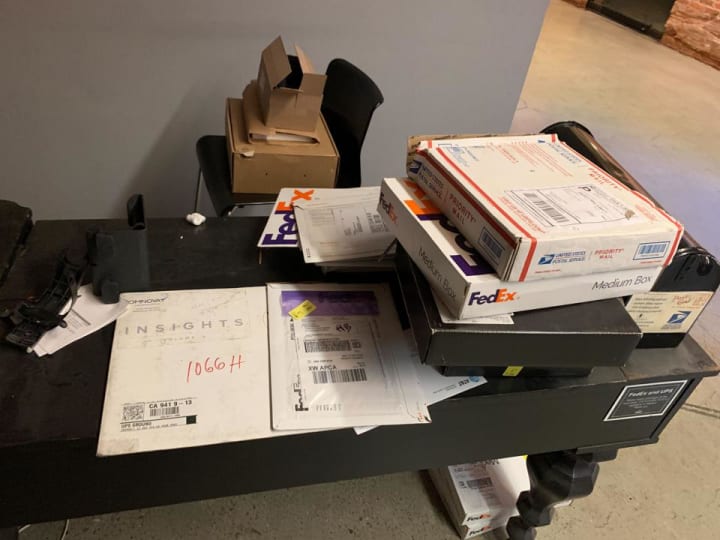
Three years ago, Mike Franz’s car was totaled in a Chicago car accident. Soon afterward, scrolling through Facebook, he saw an ad for an Indiegogo crowdfunding campaign for a gadget called “Vezo 360,” which touted itself as the “First 4K 360 Degree Smart Dash Cam.”
Franz, now 29, paid $199 for the camera on the expectation that it would be ready quickly. “When I bought, it said it was 30 days, because otherwise I wouldn't have,” he says. But no dashcam ever arrived, Franz says, and today there are many 360-degree cameras on the market. He says he’s no longer interested in Arvizon’s, which he believes will be obsolete if it ever shows up.
“I have no faith in it anymore,” Franz says. “I’ve written that money off, and it made me lose faith in Indiegogo. This is my first one and they weren’t helpful at all.”
Franz is one of more than 10,000 people in countries ranging from Australia to Saudi Arabia who collectively forked over $2.5 million via the two major crowdfunding platforms — Indiegogo and Kickstarter — to the small South Korean dashcam company, called Arvizon.
Three years after the crowdfunding campaigns began, Arvizon has little to show for it, other than livid customers. And over that period, Arvizon has provided few concrete details as to how it spent the money it raised.
Both of the major crowdfunding platforms used in the company’s campaign have grown rapidly in recent years as thousands of would-be entrepreneurs turn to the grass-roots fundraising vehicles for easy access to capital. Since Kickstarter launched in 2009, campaigns on the platform have collectively raised nearly $5.5 billion – growing from $2.5 million in 2009, its first year of operation, to more than $777 million in 2020, the most recent numbers the company says it can provide. Indiegogo, while declining to provide annual figures, says campaigns on the site have raised a total of $2.4 billion since it began in 2008. There’s no public data on how many of these campaigns are disputed by disappointed backers.
The Arvizon case is just one example in which crowdfunding campaigns on the platforms failed to fulfill donor expectations, whether because a given company’s product aspirations didn’t work out as planned or because the campaign wasn’t legitimate in the first place. Late last year, the Federal Trade Commission issued a warning to consumers that “scammers could be behind those crowdfunding efforts and take your money without delivering what they promise.”
In recent years, as crowdfunding platforms have grown in size, there have been numerous large flameouts, including a beverage cooler company that raised more than $13 million in 2014 before collapsing and agreeing in a settlement with the U.S. Justice Department to repay investors a portion of their money. In some cases, such as with a gaming console called Ouya that raised $8.5 million on Kickstarter in 2012, money has been raised for seemingly legitimate products that fizzled when released. In 2020, the FTC settled charges with a company that raised $800,000 on Indiegogo and Kickstarter to create an “iBackpack” that was never completed — the money raised was used for the founder’s personal expenses and marketing budget, the agency said. But FTC enforcement action against questionable crowdfunding campaigns is fairly rare.
Mark Hiraide, a Los Angeles-based attorney, and expert in business finance law, said that crowdfunding platforms can fall into a nether region in which unscrupulous companies can walk away with large sums of money and the platforms can disclaim any liability. “There are people that are taking advantage of the gray area – it walks like a security and quacks like a security, or the sale of a product — but they offer on these platforms, products that are supposed to be for donations,” he said.

Forbes spoke with seven people in five countries who all told the same basic story about the Arvizon crowdfunding campaign: They were swayed by the company’s slickly-produced video and promises but now have written off any hope of receiving the product they believed they were paying for. They also say they feel frustrated that the crowdfunding sites, Kickstarter and Indiegogo, which both take a 5 percent cut of money transferred via their platforms, seem unable or unwilling to take any substantive corrective action.
“There doesn’t seem to be any accountability for Kickstarter or Indiegogo,” says Karl Bundy, 59, a retired pilot from Bournemouth, United Kingdom, who also backed the Vezo 360 camera. “The fact that they allow this to go on and they allow a project on their site to take money: Kickstarter and Indiegogo don’t seem to be that worried about it.”Arvizon declined to answer questions about the crowdfunding campaign for the camera or the money that was invested in it. When asked to respond to a list of specific questions, a person replying to an email sent to an Arvizon address ([email protected]) declined to do so and instead largely responded with unusual and accusatory messages.
“Are you hiding something?” the person, who declined to reveal their name, wrote to Forbes. “How do I trust you guys not going to change the answers you are getting from the company [as journalists always do]?”Arvizon also responded to questions by emailing legal agreements with which it said Forbes would need to comply before the company would make anyone available for any interview, including the person identified on LinkedIn and 2019-era press materials as its CEO, Vivek Soni.
One recent email from Arvizon to Forbes stated “anything published about Arvizon Inc without our written permission the company will take strict action.” Another mandated that “my personal name will be kept strictly confidential.”
On May 5, after again declining to answer any of Forbes’ specific questions, Arvizon sent out a lengthy email to its backers, informing them of Forbes’ inquiries.
“We tried to understand the main motive and agenda for this article, but we didn’t get any clarification from their side,” the company wrote. “Even we tried to go with the legal procedure to have the interview and help to clarify all the progress and situation. But unfortunately, they have declined to go with legal procedure. So, we’d want to emphasize that we have no clue what information he’ll post, and it might be inaccurate as well.”
The email went on to say that the company is currently “in a critical stage, with limited time remaining to deliver the goods since there will be no additional delays this time. We’re nearly there. If we engage in these sorts of activities, we risk further slowing the project, which neither we nor anybody else wants.”
Kickstarter and Indiegogo both say that they aren’t involved in agreements between project would-be entrepreneurs and investors on their platforms. “Kickstarter is not a part of the contract between creators and backers, and does not guarantee the outcome of projects,” Kickstarter spokesperson Kate Bernyk wrote in an email to Forbes. Elizabeth Hoang, a spokesperson for Indiegogo, said in an email that the Arvizon campaign was under “active investigation,” during which the platform’s trust team has “requested proof of mass production from the campaign owner.”
On May 5, Hoang emailed Forbes to say that Arvizon had provided “video evidence of mass production” — a series of short videos on Arvizon’s Indiegogo page that have little explanation or context. The following day, May 6, Hoang clarified that “Indiegogo will continue to monitor the campaign and ensure the Campaign Owner provides timely updates to backers on the status of the production and shipping.”
Under Indiegogo’s terms, campaign creators, like Arvizon, are required to “make good faith efforts to fulfill the Perks associated with Your Campaign.” Indiegogo’s terms of use also state that the company doesn’t have to get involved in disputes between campaign creators and funders. Kickstarter publicly states that it is “not a store,” and adds that it does not “oversee the performance or punctuality of projects.”
Backers of the company appear to be largely powerless. Bringing a lawsuit against Arvizon would be difficult, attorneys say.
“The donor has very little recourse,” Hiraide said, noting that it would be difficult to get a lawyer interested in a case involving such small individual losses of just a few hundred dollars each.
Even if a class-action lawsuit were to get far enough to get a judgment in the plaintiffs’ favor, Hiraide added, it's not clear what, if any, meaningful and obtainable assets a foreign company like Arvizon would have.
A state or federal regulator such as the Federal Trade Commission could also take up a case. It is unclear why some crowdfunding campaigns draw the agency’s attention, while others do not. “Since FTC investigations are nonpublic, we generally do not comment on whether we are investigating a particular company or matter,” Juliana Gruenwald Henderson, an FTC spokesperson, said in an email.
According to records Forbes obtained from the FTC, almost 100 people have filed complaints regarding Arvizon – most of them reporting experiences similar to the ones Franz describes.
One person from Florida, whose name was withheld by the FTC, wrote: “The product was promised for October 2020, never happened, they create delay, excuses, the product doesn't exist. And they are still giving excuses.”
Another person, from Germany, wrote: “I contributed to a project that promised to deliver a dashcam back in 2019. I never received anything, the social media accounts are not updated for months and a refund was refused by the company. The company gives meaningless updates on IndieGoGo from time to time.”
The comments pages related to Arvizon’s camera campaign on both Indiegogo and Kickstarter are filled with similarly frustrated backers demanding their money back. The FTC records show that these donors spent between $150 and $700 each on the platforms.This isn’t the first time Arvizon CEO Soni has been behind a failed crowdsourcing campaign. In January 2017, a company at which he served as a CTO for, Vuo Inc., launched a Kickstarter and Indiegogo campaign to build a similar 360 degree camera. Vuo, Inc. lasted nearly four years and raised $191,000 from 699 backers, until CEO HunJoo Song proclaimed in December 2020 that the corporation was formally “suspended.” No camera was ever produced.
In press materials released on the company’s website in 2019, Arvizon CEO Soni said the idea for the company began in 2017 after it realized the “severity” of drowsiness-related road deaths.
“We wanted to invent a smart solution that protects drivers. We came up with the Vezo 360 dashcam,” he wrote. “Vezo’s features not only protect the driver while they are on the road, but also protect the car while the driver is away.”
The earliest version of its website, from 2016, said the company was “working on something awesome,” but providing little other information. Two years later, the company’s website touted itself as a “a software development company with a special focus on start-up and growth companies.”
At some point in 2018, Arvizon decided to get involved in making dashcams. The idea was apparently good enough to be accepted into The Vault Korea, a Korean startup accelerator. Arvizon was invited to The Vault’s San Francisco headquarters and given “opportunities for education, mentoring,” according to SangUk Kim, the manager of The Vault Korea.
Arvizon presented the product at least once at the San Francisco location in November 2018, with little success. “Their pitching didn’t lead to investment,” Kim said in an email.
After that, Arvizon went the crowdfunding route.
Speaking in a video produced by Seoul Startup Hub, Arvizon CEO Soni said that the Vezo 360 was “not like traditional dashcams,” because it was “totally based on IoT,” he said, referring to the Internet of Things. Additionally, he said, the camera has “AI,” that can recognize facial expressions to wake up a drowsy driver.
Arvizon’s Kickstarter campaign launched several weeks later, in April 2019, promising to ship the cameras by September 2019. The campaign raised over $650,000, according to its Kickstarter listing. In May 2019, the Korean firm launched a similar campaign on Indiegogo, promising to ship by December 2020, where it raised nearly $2 million.

Arvizon claims that its “USA Office” is at 415 Jackson St., in downtown San Francisco. Forbes recently went to this office and found a basement co-working space, called The Vault, which had clearly been long-shuttered. Mail dating back several months was piled up at a reception area.
In a brief phone call with Forbes, Ross Mini, the property manager of 415 Jackson St. said that The Vault has been closed “for about a year.” The Vault’s social media accounts have not been active since March 2020.
Still, Arvizon is trying to forge ahead.
Just last month, after inquiries from Indiegogo, the would-be dashcam maker released its series of short videos purporting to show “mass production molds.”
“Today's update is regarding the mass manufacture of the dashcam's main body,” the company wrote on Indiegogo. “So, finally, we have begun mass production of our dashcam main body. The brief clips below were sent to us by our partner manufacturer. Where they showed each body part component being mass-made.”
The videos were unconvincing to some backers.
“Last month you say mass production and now almost 1 month there is nothing about when you’re going to ship out or how you’re going to ship out,” wrote one man who listed his name as Robert Lee. “Is this another excuse? If you can’t [deliver] your promise just give us the money back and stop all the BS.”






Comments
There are no comments for this story
Be the first to respond and start the conversation.